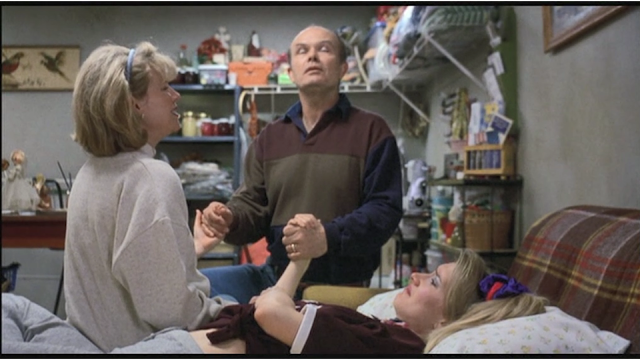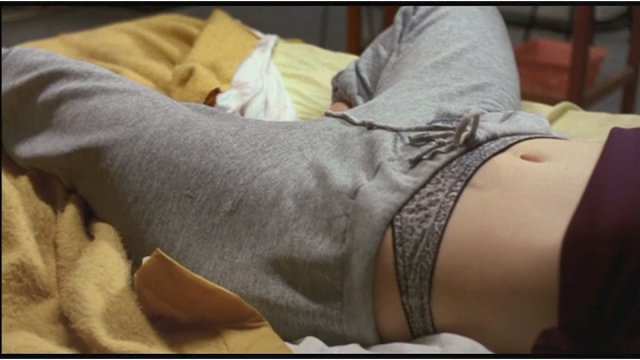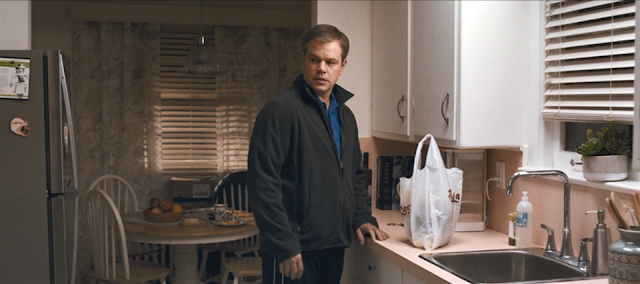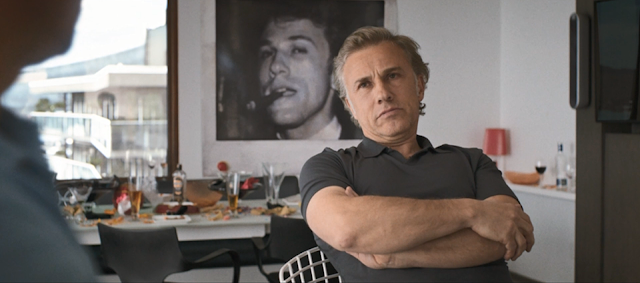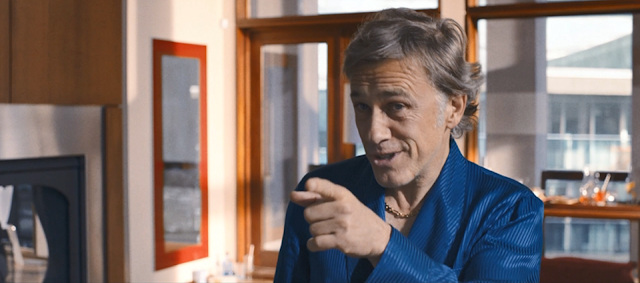I’m going to look at two more films directed by Alexander
Payne. They happen to be his first major
film and as of right now in 2022, his most recent film. Let’s first take a look at Citizen Ruth.
This came out in 1996. Laura Dern plays Ruth Stoops. Ruth is despicable. I mean she is a horrible person. She is uneducated, vulgar, promiscuous, and never thinks of anybody or anything but herself. She will ingest just about anything in order to get high.
She is also manipulative. Whenever she is in need or confronted, she will break down into a pathetically false cry for help – promising that she will turn her life around. We know it’s false because she goes right back to being her despicable self as soon as she gets her way. Nobody, and I mean nobody loves or even likes Ruth.
But this movie is not about Ruth.
When she gets pregnant and has a judge slyly suggest that
she get an abortion in order to avoid jail, suddenly, everyone is interested in
Ruth. Well, not really. What is really happening is people overlook
her vileness and see her as a cause.
A quintessential mid-American family intercedes and takes Ruth into their home to save her from the abortion she wants. This family belongs to an organization that believes in taking in young pregnant women and convincing them not to have an abortion. This is the place in the film where many in the viewing audience are going to think to themselves “Here we go with a typical Hollywood propaganda film that’s going to shove the pro-abortion narrative down our throats.”
It does seem this way.
This “wholesome” family seems to be exactly how pro-abortionists would
portray such a family. They are
dysfunctional. They are not the clean,
god-fearing, All-American nuclear family they seem to be on the surface.
The mother and father are always praying and singing and praising God and working religion into their common speech.
Then you get the doctor and nurse always smiling and treating Ruth like a child. The head of the anti-abortionist organization is clearly not the wholesome man of God he portrays.
Yes. You can see
these people seem to be an amalgam of stereotypical anti-abortionists. This movie reeks of modern Hollywood
filmmaking.
Or does it?
We get to
see the other side too. Ruth ends up
with the pro-abortionists and we can see they’re just as fake. They perceive themselves as at war with the
other side.
Just like the anti-abortionists, Ruth becomes a cause to the pro-abortionists. They’ll support Ruth’s decision as long as she chooses abortion. They soon figure out she is a worthless, scum of a woman. But they take advantage of her desperate situation.
Ruth ultimately miscarriages which would nullify the whole debate except that, Ruth being Ruth, doesn’t tell anyone and gets away with $15,000, no abortion to deal with, and no causes to suffer through. She will go back to her previous life.
Harlan, the man she effectively stole the money from, knew who she was.
Again, this is not about Ruth. Ruth is merely a vehicle whom the story uses
to present the abortion issue to the viewers.
It can even be said that the movie itself, exploits Ruth to present an
idea. Some may argue that Citizen Ruth
is a pro-abortion film. Some may argue
that it’s an anti-abortion film. People
see in films what they want to see. I
personally think it’s neither. It just
presents the issue and gives us something to think about.
Then you have Paul Safranek played by Matt Damon. He, like Ruth, finds himself in the middle of two sides of an issue. Paul is not a horrible example of a human being as is Ruth. Paul just happens to be the blandest human being on Earth. Paul doesn’t stand for anything. He’s the proverbial reed floating downstream and goes where the flow takes him. To be fair, his wife Audrey Safranek is just as boring as he is.
Throughout the film Downsizing, Paul is bombarded with other
people’s opinions. He in turn, is
influenced by every single one of them because he can’t think on his own. His
friend encourages him to downsize and live in Leisure Land.
Paul does this. The saleslady
flatters Paul because she knows exactly how to manipulate him into upgrading
his purchase. This makes Paul a perfect
vehicle to put the viewers through the climate change issue.
The act of downsizing is a fictional near-future process of shrinking people down to 5 inches tall in order to deal with world problems such as pollution and over-population.
But this film isn’t about downsizing. That’s the problem. At least, that’s the problem many viewers had, and this shows in the many, many negative reviews throughout the Internet.
The trailers for Downsizing led the public into the belief that this would be a goofy comedy with small people in a big people world. People went into the theater ready to laugh at over-sized objects and unusual ordeals people five inches tall would have to deal with. Instead, they left the theater scratching their heads wondering what they just witnessed.
The many negative reviews and poor box-office numbers show that people don’t like being bamboozled. Also, many felt they were deliberately deceived into watching yet another propaganda Hollywood flick meant to shove left-wing perspectives down their throats.
They were mostly right.
Downsizing, indeed, does seem to preach about the human race needing to do something now before it’s too late. In this fictional future, the downsizing process is the solution, but the tipping point has already been reached. Now, we’re doomed.

Since Downsizing puts the viewers in the perspective of
Paul, it’s easy to fall into the same trap he does. That is to take everything presented at face
value. We already know that Paul is
easily impressed. The downsizing process
amazes him. He is thrilled to meet the
surviving Vietnamese woman who had 15 minutes of fame. He is starstruck with meeting “Little
Ronnie”, the first small-born person. Of
course, he is impressed with Dr. Jorgen Asbjørnsen, the scientist who invented
downsizing. He and his coalition of 26
Nobel Prize winners all deemed that an extinction level event was
inevitable. That was certainly enough
for Paul. He buys the tale completely.
Would you buy this story?
I ask because in the real world, we are being repeatedly told that 97%
of scientists in the world agree that a climate disaster is upon us. So, does the typical movie viewer get
influenced by statements like this? Are
many or most of us like Paul?
Meet Dusan Mirkovic. He is played brilliantly by Christoph Waltz. He sees through all the salesmanship most of the rest of the world succumbs to. He is not small to save the planet. In fact, he despises most small people because he knows that going small for most, is a way to upgrade social standing with the bonus element of believing they are “saving the planet”.
Dusan is small only because he is an opportunist. He figures out that small people are going to have needs nobody else thought of. Dusan is the opposite of Paul, but Dusan seems to see Paul as a challenge. He quickly figures out who Paul is and how malleable his perspectives can be. Dusan becomes a father figure to Paul.
“Dusan will save you.”
Dusan not only saves Paul, he saves the whole movie. He doesn’t believe in all the doom and gloom
stuff that everyone else is being sold.
He subtly guides Paul into thinking for himself. It takes Paul the rest of the movie to
finally realize what he really wants out of life. Dusan is the smartest individual in the
movie.
Let’s take a quick look at “Little Ronnie”, the first person
born small. Paul sees him as a
celebrity. Dusan sees him as a loser who
will likely die of syphilis. This is
symbolic of how Paul was sold, but Dusan understands the truth.
The big explosion that was supposed to occur near the end was a little “pop”. This is also symbolic that the looming big disaster may not be such a big deal.
Like Citizen Ruth, Downsizing presents the issue and doesn’t take a stand. Citizen Ruth is a simpler story, so the message is clearer. Downsizing has the problem that it misled the audience into thinking this was a comedy, or a modern version of the old TV show Land of the Giants. It also has the problem of taking too long to get to its somewhat clouded message. Today’s movie audiences are generally not patient enough to go through all of this.
I have another few points about Downsizing. There’s a dark undertone in the film as
well. Ngoc Lan Tran was shrunk against
her will and shipped to the U.S. in a box to dispose of her. The brief news report hints that this is a
common way governments can get rid of “undesirables”. Not every small person lives the good life. There’s an exposed area outside of Leisure Land
that has become a slum for these undesirables.
Notice how the “big” nurses that are at the beginning of the process are
white females, but the nurses at the other “small” end are black males with
foreign accents.
How can Dusan sell cigars for one dollar each instead of fifty dollars? You’ll think at first that since there is so much less material and that would be true. However, who’s making these cigars? The labor involved would be the same, if not more. Dusan speaks of “tiny Albanians”. It sounds to me like low-wage, if not slave labor in this small world.
The drunk guy at the bar raises some interesting points about small people having the same rights as big people even though they don’t contribute as much to society, overall. Notice how his little rant are common arguments about homeless people and illegal immigrants.
“You’re not buying as many products. You’re not paying any sales tax. Some of you aren’t paying any income tax. I mean you’re not really participating in our economy, are you? In fact, you’re costing us money and jobs.”
One more note. I am
linking similarities between Citizen Ruth and Downsizing. There is a more direct link in that Laura
Dern (Ruth) makes a brief appearance in Downsizing.





